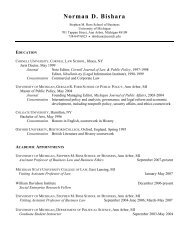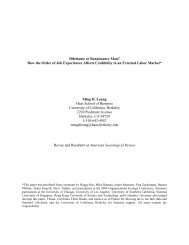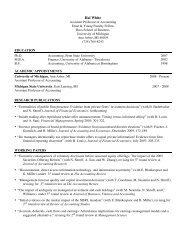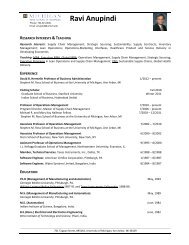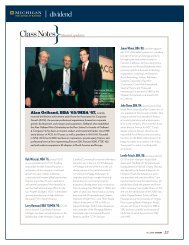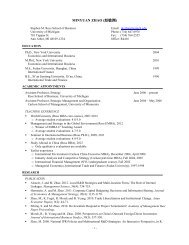DIvIDEnD - Stephen M. Ross School of Business - University of ...
DIvIDEnD - Stephen M. Ross School of Business - University of ...
DIvIDEnD - Stephen M. Ross School of Business - University of ...
You also want an ePaper? Increase the reach of your titles
YUMPU automatically turns print PDFs into web optimized ePapers that Google loves.
DIvIDEND: Sensory marketing has been called the next<br />
frontier <strong>of</strong> marketing. Why is it important for people to<br />
understand and research sensory marketing?<br />
KRISHNA: in the 1970s people talked a lot about branding<br />
as the most important product differentiator. firms realized<br />
that brands could command a premium, and the marketing<br />
focus shifted to creating brand names. one memorable<br />
example is levi’s. everybody wanted to wear levi’s because<br />
<strong>of</strong> the brand recognition.<br />
sensory marketing is more subconscious. all your senses<br />
are responding to a stimulus. take the case <strong>of</strong> Play-doh. you<br />
smell it and immediately feel an attachment. it evokes many<br />
<strong>of</strong> your childhood memories, and you feel very close to the<br />
brand. you are responding in an automatic, subconscious<br />
way. in that case, the brand is able to build a better relationship<br />
with the consumer by using a particular sense.<br />
sensory marketing will persist because senses can affect<br />
the marketing <strong>of</strong> products in many ways. for instance, sense<br />
can be used as a symbol or signature (tiffany’s blue), for<br />
arousal (when artificial smells are sprayed in cookie and<br />
pizza stores, or when abercrombie & fitch plays loud music<br />
to attract teenage customers), or even for making an invisible<br />
product visible (such as the intel Pentium chip with its<br />
signature sound). in fact, sensory aspects <strong>of</strong> products affect<br />
us in ways we had never imagined.<br />
DIvIDEND: Why haven’t the sensory aspects <strong>of</strong> products<br />
been emphasized as much in the past?<br />
KRISHNA: i think people were overly focused on the visual<br />
aspects <strong>of</strong> products. they somehow ignored the others. no<br />
one had thought consciously about sensory marketing. People<br />
were being impacted by other senses then, but companies were<br />
not doing enough in terms <strong>of</strong> creating the brand, the packaging,<br />
the advertising, etc. to really engage all the consumers’ senses.<br />
But certain things were being done, just without conscious<br />
knowledge. for example, perfume bottles have been elaborate<br />
for a long time, and people’s desire for the perfume was<br />
affected as much by the bottle as by the perfume itself.<br />
another example <strong>of</strong> early sensory marketing is the nBc logo.<br />
when you hear those three notes, you instantly recognize it.<br />
that chime was created in the 1930s. But now firms are<br />
saying, “wow, that’s such a memorable sound. look at what<br />
sound is doing for nBc. maybe with our product, we should<br />
create a logo with such a sound.” that kind <strong>of</strong> recognition<br />
wasn’t there before. People are starting to engage the senses<br />
more consciously now.<br />
DIvIDEND: What tips do you have for a company<br />
with a new product that wants to take some first<br />
steps toward marketing more sensorially?<br />
KRISHNA: they have to really try to understand their product<br />
and their marketing efforts. they should ask themselves,<br />
“which senses am i engaging with my marketing efforts?<br />
can it be done any differently? can i somehow engage the<br />
consumers’ auditory sense? can this product be made more<br />
engaging from an olfactory perspective?”<br />
you really have to look at every aspect <strong>of</strong> your product,<br />
along with the packaging and the advertising, and then assess<br />
how it can be made more sensorially engaging.<br />
DIvIDEND: How can firms keep the senses in mind<br />
when creating a new product?<br />
KRISHNA: look at the example <strong>of</strong> the iPod touch. i think<br />
it’s a brilliant effort because just by calling it “touch,” they’ve<br />
already started marketing it sensorially. in all their advertising,<br />
they keep emphasizing the touch<br />
element. the important lesson<br />
from the iPod touch is how apple<br />
has managed to direct attention<br />
to that element <strong>of</strong> the product<br />
in such a way that it creates an<br />
emotional connection with the<br />
consumer. the product is so<br />
sensorially engaging that it is no<br />
longer just an mP3 player but<br />
more like a cherished pet. in fact,<br />
iPod touch owners may wince if i<br />
call it a gadget, since they think <strong>of</strong><br />
it as much more than a gadget.<br />
with iPod touch, the name<br />
itself clearly emphasizes touch,<br />
but apple also has very cleverly<br />
> pr<strong>of</strong>essor Aradhna Krishna<br />
has compiled the first volume<br />
<strong>of</strong> cutting-edge research in<br />
sensory marketing.<br />
utilized the good feelings that go with touch in their product<br />
descriptions. for instance, in describing their design they say,<br />
“iPod touch feels even better in your hand”; when describing<br />
the mobile games they state, “iPod touch puts an amazing<br />
gaming experience in the palm <strong>of</strong> your hand.” the ads imply<br />
that the touch <strong>of</strong> the user’s finger is very powerful — with a<br />
single touch the user can access the internet, look at a map,<br />
order dinner, and do a plethora <strong>of</strong> other things. apple has used<br />
touch, beyond the physical property <strong>of</strong> touch, to create<br />
stronger emotional attachments, build a closer relationship with<br />
the consumer, and generally make the product more exciting.<br />
DIvIDEND: How can marketers avoid overstimulating<br />
consumers? Do products have to use a specified sense<br />
in marketing efforts (e.g., taste marketing only can be<br />
used for food products)?<br />
KRISHNA: one concern is overstimulation from one<br />
product, and another concern is overstimulation from the<br />
spring 2010 <strong>DIvIDEnD</strong> 19



